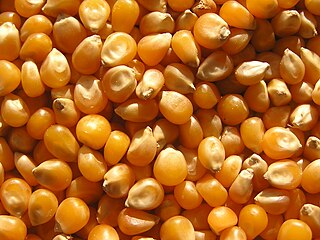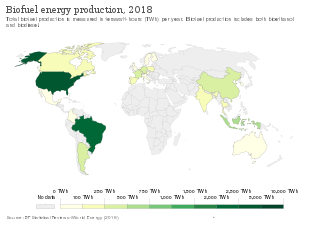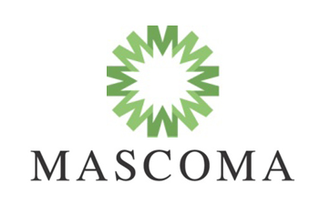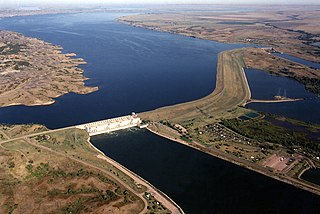
Ethanol fuel is ethyl alcohol, the same type of alcohol found in alcoholic beverages, used as fuel. It is most often used as a motor fuel, mainly as a biofuel additive for gasoline. The first production car running entirely on ethanol was the Fiat 147, introduced in 1978 in Brazil by Fiat. Ethanol is commonly made from biomass such as corn or sugarcane. World ethanol production for transport fuel tripled between 2000 and 2007 from 17×109 liters (4.5×10^9 U.S. gal; 3.7×10^9 imp gal) to more than 52×109 liters (14×10^9 U.S. gal; 11×10^9 imp gal). From 2007 to 2008, the share of ethanol in global gasoline type fuel use increased from 3.7% to 5.4%. In 2011 worldwide ethanol fuel production reached 8.46×109 liters (2.23×10^9 U.S. gal; 1.86×10^9 imp gal) with the United States of America and Brazil being the top producers, accounting for 62.2% and 25% of global production, respectively. US ethanol production reached 57.54×109 liters (15.20×10^9 U.S. gal; 12.66×10^9 imp gal) in May 2017.
Cellulosic ethanol is ethanol produced from cellulose rather than from the plant's seeds or fruit. It can be produced from grasses, wood, algae, or other plants. It is generally discussed for use as a biofuel. The carbon dioxide that plants absorb as they grow offsets some of the carbon dioxide emitted when ethanol made from them is burned, so cellulosic ethanol fuel has the potential to have a lower carbon footprint than fossil fuels.

Corn stover consists of the leaves, stalks, and cobs of maize (corn) plants left in a field after harvest. Such stover makes up about half of the yield of a corn crop and is similar to straw from other cereal grasses; in Britain it is sometimes called corn straw. Corn stover is a very common agricultural product in areas of large amounts of corn production. As well as the non-grain part of harvested corn, the stover can also contain other weeds and grasses. Field corn and sweet corn, two different types of maize, have relatively similar corn stover.

Iogen Corporation is a Canadian company based in Ottawa, Ontario, Canada, and was founded by Patrick Foody Sr. in 1975.
Corn construction refers to the use of corn (maize) in construction. The tassel, leaf, silk, cob in husks, and the stalk are the parts of corn. According to the Michigan Department of Agriculture, "corn can be made into fuel, abrasives, solvents, charcoal, animal feed, bedding for animals, insulation, adhesives, and more. The kernel is used as oil, bran, starch, glutamates, animal feed, and solvents. The silk is combined with other parts of the corn plant to be used as part of animal feed, silage, and fuels. Husks are made into dolls and used as filling materials. The stalk is used to make paper, wallboard, silage, syrup, and rayon ."

Corn kernels are the fruits of corn. Maize is a grain, and the kernels are used in cooking as a vegetable or a source of starch. The kernel comprise endosperm, germ, pericarp, and tip cap.
Xethanol AMEX: XNL was one of the smaller producers of corn ethanol in the United States, and one of the few publicly traded companies developing technology for producing cellulose ethanol. Ethanol fuel will have increased production from a current level of about 5 billion US gallons (19,000,000 m3) per year to over 20 billion US gallons (76,000,000 m3) annually. Potentially 60 to 100 billion US gallons of ethanol could be produced annually in a sustainable manner from domestic biomass resources. To achieve these goals some believe it will be necessary to develop and commercialize technology for the production of ethanol from cellulose and hemicellulose. Xethanol says it plans to increase production and profitability with new technology it has under development.

The United States became the world's largest producer of ethanol fuel in 2005. The U.S. produced 15.8 billion U.S. liquid gallons of ethanol fuel in 2019, and 13.9 billion U.S. liquid gallons in 2011, an increase from 13.2 billion U.S. liquid gallons in 2010, and up from 1.63 billion gallons in 2000. Brazil and U.S. production accounted for 87.1% of global production in 2011. In the U.S, ethanol fuel is mainly used as an oxygenate in gasoline in the form of low-level blends up to 10 percent, and, increasingly, as E85 fuel for flex-fuel vehicles. The U.S. government subsidizes ethanol production.
The United States produces mainly biodiesel and ethanol fuel, which uses corn as the main feedstock. The US is the world's largest producer of ethanol, having produced nearly 16 billion gallons in 2017 alone. The United States, together with Brazil accounted for 85 percent of all ethanol production, with total world production of 27.05 billion gallons. Biodiesel is commercially available in most oilseed-producing states. As of 2005, it was somewhat more expensive than fossil diesel, though it is still commonly produced in relatively small quantities.
VeraSun Energy Corporation was a leading producer of renewable fuel. Founded in 2001, the company at one time had a fleet of 16 production facilities in eight states, of which one was still under construction. VeraSun Energy was scheduled to have an annual production capacity of approximately 1.64 billion US gallons (6,200,000 m3) of ethanol and more than 5 million tons of distillers grains by the end of 2008. The company also had begun construction at its Aurora, South Dakota facility to extract oil from dried distillers grains, a co-product of the ethanol process, for use in biodiesel production.
Blue Flint Ethanol is a bioethanol producing company and a production plant with a same name, located in Underwood, North Dakota approximately 50 miles (80 km) north of Bismarck. The plant is unique in the fact that rather than burning fuels, such as coal or natural gas to drive the production process, waste heat from electrical generation at the Coal Creek Station is used. The US$100 million plant is capable of processing 18 million bushels of corn to produce 50 million gallons of ethanol each year, and is estimated to have a net annual economic impact of $160 million on the North Dakota economy, as well as the creation of approximately 40 new jobs to run the plant. In addition to producing ethanol the plant will also produce dry distillers grains, a byproduct of the distillation process which is used as animal feed. Of the 18 million bushels of corn used each year for feedstock, the majority will be grown in southeast North Dakota and brought in via rail, with the remaining one third being produced locally. In 2006 the Blue Flint Ethanol project was awarded the Project of the Year Award by Governor John Hoeven.

Food versus fuel is the dilemma regarding the risk of diverting farmland or crops for biofuels production to the detriment of the food supply. The biofuel and food price debate involves wide-ranging views, and is a long-standing, controversial one in the literature. There is disagreement about the significance of the issue, what is causing it, and what can or should be done to remedy the situation. This complexity and uncertainty is due to the large number of impacts and feedback loops that can positively or negatively affect the price system. Moreover, the relative strengths of these positive and negative impacts vary in the short and long terms, and involve delayed effects. The academic side of the debate is also blurred by the use of different economic models and competing forms of statistical analysis.
Coskata, Inc. was a Warrenville, Illinois based energy company incorporated in 2006 by serial entrepreneur Andrew Perlman's GreatPoint Ventures group. The company was developing processes for the production of cellulosic ethanol from woodchips. Coskata's process combines both biological and thermochemical processing. The estimated cost of production via this technology was reported as under $1 per gallon, as opposed to corn-based ethanol costing approximately $1.40 per gallon
The Renewable Fuel Standard(RFS) is an American federal program that requires transportation fuel sold in the United States to contain a minimum volume of renewable fuels. It originated with the Energy Policy Act of 2005 and was expanded and extended by the Energy Independence and Security Act of 2007. Research published by the Government Accountability Office in November 2016 found the program unlikely to meet its goal of reducing greenhouse gas emissions due to limited current and expected future production of advanced biofuels.
There are various social, economic, environmental and technical issues with biofuel production and use, which have been discussed in the popular media and scientific journals. These include: the effect of moderating oil prices, the "food vs fuel" debate, poverty reduction potential, carbon emissions levels, sustainable biofuel production, deforestation and soil erosion, loss of biodiversity, effect on water resources, the possible modifications necessary to run the engine on biofuel, as well as energy balance and efficiency. The International Resource Panel, which provides independent scientific assessments and expert advice on a variety of resource-related themes, assessed the issues relating to biofuel use in its first report Towards sustainable production and use of resources: Assessing Biofuels. In it, it outlined the wider and interrelated factors that need to be considered when deciding on the relative merits of pursuing one biofuel over another. It concluded that not all biofuels perform equally in terms of their effect on climate, energy security and ecosystems, and suggested that environmental and social effects need to be assessed throughout the entire life-cycle.

The use of biofuels varies by region. The world leaders in biofuel development and use are Brazil, United States, France, Sweden and Germany.

Mascoma Corporation was a U.S. biofuel company founded to produce cellulosic ethanol made from wood and switchgrass. Headquartered in Lebanon, New Hampshire, the company was founded in 2005 by Robert Johnsen (CEO), Lee Lynd and Charles Wyman, two professors from Dartmouth College. The company was named after Mascoma Lake, which is near Lebanon. In November 2014, the yeast-related business assets including the Mascoma name were purchased by Lallemand, Inc. of Montreal, Canada. The R&D facility in Lebanon, NH was renamed Mascoma LLC which is now a subsidiary of Lallemand. The remaining business assets of the former Mascoma Corp. including the thermophilic bacteria technology, pilot plant in Rome, NY, and former headquarters in Waltham, MA were renamed Enchi Corporation.
United States policy in regard to biofuels, such as ethanol fuel and biodiesel, began in the early 1990s as the government began looking more intensely at biofuels as a way to reduce dependence on foreign oil and increase the nation's overall sustainability. Since then, biofuel policies have been refined, focused on getting the most efficient fuels commercially available, creating fuels that can compete with petroleum-based fuels, and ensuring that the agricultural industry can support and sustain the use of biofuels.

Jeff Broin is the founder of POET, LLC, a leading producer of biofuels and coproducts. He currently serves as Chairman and CEO.

Renewable energy in South Dakota involves production of biofuels and generation of electricity from renewable sources of energy such as wind and hydropower. South Dakota is among the states with the highest percentage of electricity generation from renewable resources, typically over 70 percent. In 2011, South Dakota became the first U.S. state to have at least 20% of its electricity generation come from wind power.








